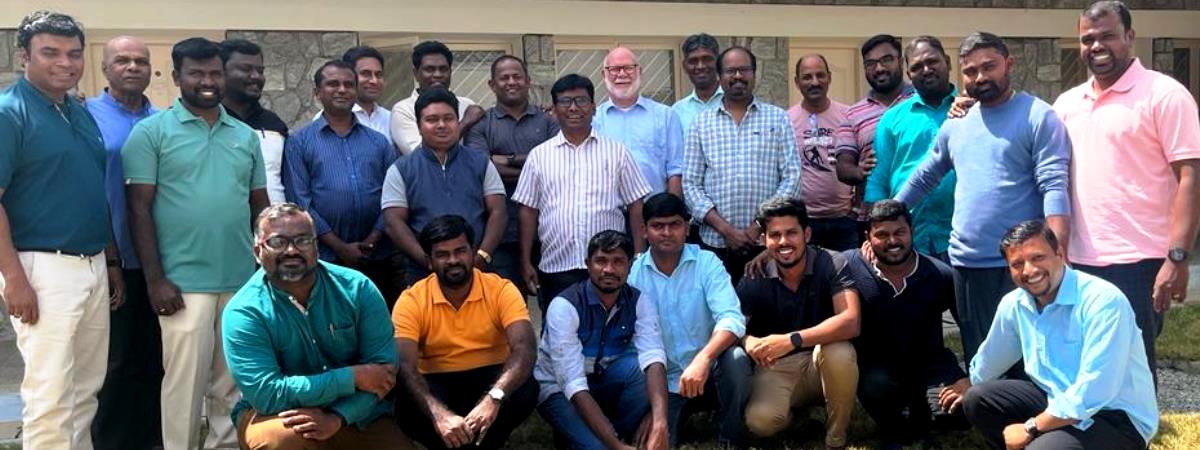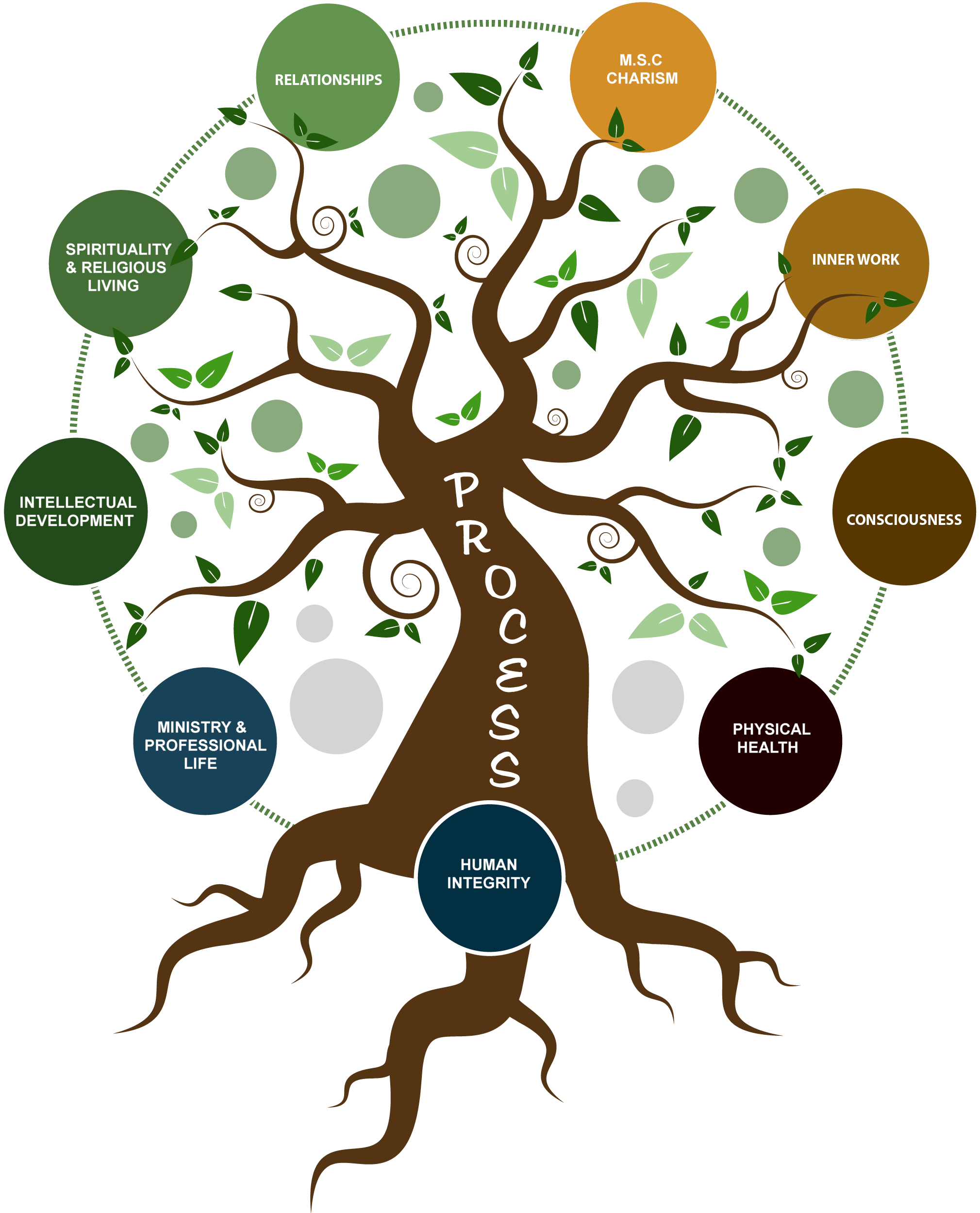
For Missionaries of the Sacred Heart, ongoing formation is a life-long integration of all the elements of life. With our leaders’ support we have a special mandate to undertake our continuing formation and education. 1MSC Constitutions #172 S. “The Provincial Superior’s duty is to promote the good of the whole Province. Conscious of the importance of the personal commitment, the continuing formation and education of each member, he will make himself available to them by visiting the communities and keeping in regular contact with them all.” In the homily of an ordaining bishop was the statement, “If you want to be a good priest, first be a good MSC, and if you want to be a good MSC, first be a good human being.”2 Bishop Geoffrey Robinson former auxiliary bishop of Sydney, much esteemed by Australian Catholics for the integrity with which he took on the terrible task of working out a national response to the clerical sexual abuse crisis. Quoted from his homily given at the ordination of Peter Hendriks MSC.
Perhaps that is the challenge of ongoing formation – to be a man whose life gives witness to a robust maturity; a maturity that isn’t found lacking; a maturity that manifests equanimity and consistency in the living out of needs and values. Ongoing formation requires the MSC to participate in becoming the best human being he can be. Becoming is an important word, because it suggests we are not complete, but on the way, or as these pages will stress, we are in process.
Good formation is an accompaniment in the process of becoming. MSC ongoing formation is oriented in the direction of enabling members to courageously and willingly undertake their personal and professional growth, so that our religious life can give valiant witness to the mission of making the heart of God known on earth.

Formation not Information
The term ‘information’ is used in this context as a static reality unchanged by how or by whom it is used. Information is data, passed on without any guarantee that the values inherent in the data will effect change, be interiorized and integrated, or even be relevant to a person. Some approaches to religious instruction are built on this practice of master handing on information to students. The task of the student is to receive, memorize and apply the knowledge.
Ongoing formation however, is a dynamic process.3 (ongoing formation) …is the totality of the endeavours assumed by religious, in the consciousness that they are led by the grace of God to cling with a positive and active steadfastness to their spiritual and ecclesial identity, so that they remain able and flexible enough to make a positive response, in the Lord’s name, to the various demands of their vocation across time and space. The Way. Ongoing Formation: continuing renewal. Joseph Aubry S.D.B. Our understanding of the world is rapidly changing, and the exploration of what was once considered immutable, now shows itself to be in a constant state of transformation and movement. We are confronted with this state of flux in the quantum, personal, communal, planetary, cosmic, and even spiritual dimensions of our lives. Our experience of our humanity is no exception to this and the constant exploration of motivations is increasingly important for people to live authentic lives with integrity.4 “Saint John Paul II became increasingly concerned about this issue. In his first Encyclical he warned that human beings frequently seem “to see no other meaning in their natural environment than what serves for immediate use and consumption”. Subsequently, he would call for a global ecological conversion. At the same time, he noted that little effort had been made to “safeguard the moral conditions for an authentic human ecology”. The destruction of the human environment is extremely serious, not only because God has entrusted the world to us men and women, but because human life is itself a gift which must be defended from various forms of debasement. Every effort to protect and improve our world entails profound changes in “lifestyles, models of production and consumption, and the established structures of power which today govern societies”. Authentic human development has a moral character.” LAUDATO SI’. Pope Francis. 2015. §5. 5“The process of building fraternity, be it local or universal, can only be undertaken by spirits that are free and open to authentic encounters.” FRATELLI TUTTI. Pope Francis. October 3, 2020. §50
This is the purpose of a process-oriented approach. It requires a person to engage with and explore the subjective experience, values, principles and meaning inherent in their perceptions and judgements. It helps them to clarify their motivations and discover consistencies and inconsistencies between the ideals that they aspire to and the actual realities that influence their lived behaviour.
Process is the Process
When a member participates in process-oriented ongoing formation, reflecting on their own motivations, sharing this with others, and evaluating their discoveries, being in the process itself shifts their perspective. 6“Finally, process philosophy allows us to better understand the nature of science itself. Most scientists subscribe to a realist view of the world. We assume that there is a unique structure of reality that is at least partially accessible by rational means, the scientific method in particular. However, scientific inquiry always involves a subjective element: the scientist as an active agent. Somebody is coming up with questions and is implementing the theories and experiments required to answer them. Science is a process, a constant interaction between the scientist, the question and the structure of reality. In this sense, our knowledge, even scientific laws, are always context dependent, and only valid in relation to the subjective question we had, and the kind of explanation that we find satisfying. Each one of us brings his or her own perspective into the game. Ours, as we have explained in this essay, is a perspective based on process.” Everything flows: A process perspective on life. by Johannes Jaeger and Nick Monk. This shift in perspective heralds a nascent conversion in them, expanding their world-view and opening them to new and more wholesome possibilities. While desirable outcomes may result from participating in process, the focus on participating openly in the process itself is the desired outcome. Process is participation focussed, not outcomes focussed.
From Experience to Conversion
In his work Insight: A Study of Human Understanding,7Insight; a study of human understanding. B. Lonergan. Oxford, England: Philosophical Library, 1957. Bernard Lonergan SJ, was partly concerned with what he would later come to call intellectual conversion, while in Method in Theology8Method in Theology. Bernard Lonergan. London: Darton, Longman and Todd, 1972. he expanded the range of concerns to include moral and religious conversion. Intellectual conversion entails understanding what you are doing when you are knowing. You realize that knowing something requires more than just taking a look at what is there outside of yourself. It also requires using your mind to understand and make judgments. So, you come to grasp how reality is much more than just what meets the eye. But it is also more than just your subjective ideas. Lonergan explains how objectivity is the result of authentic subjectivity. Moral conversion involves a shift in your criteria of decision-making from a self focus to higher values. Religious conversion is a falling-in-love with God.9Bernard Lonergan drew a map of theology for a new era. by Dennis M. Doyle. National Catholic Reporter, 30 January, 2017
Theology as “faith seeking understanding”, is a dynamic process, that shifts our sense of self in relation to our religious experience. The dynamic of reflection on experience, seeking understanding, discovering meaning, ushering forth action, is a process of conversion that moves in the direction of authenticity.
The practices and programs of ongoing formation must involve consistent self-transcendence in intellectual, moral and religious conversion. Effective ongoing formation is a dynamic process built solidly on a deep contemplation of experience that leads to lasting change.

- 1MSC Constitutions #172 S. “The Provincial Superior’s duty is to promote the good of the whole Province. Conscious of the importance of the personal commitment, the continuing formation and education of each member, he will make himself available to them by visiting the communities and keeping in regular contact with them all.”
- 2Bishop Geoffrey Robinson former auxiliary bishop of Sydney, much esteemed by Australian Catholics for the integrity with which he took on the terrible task of working out a national response to the clerical sexual abuse crisis. Quoted from his homily given at the ordination of Peter Hendriks MSC.
- 3(ongoing formation) …is the totality of the endeavours assumed by religious, in the consciousness that they are led by the grace of God to cling with a positive and active steadfastness to their spiritual and ecclesial identity, so that they remain able and flexible enough to make a positive response, in the Lord’s name, to the various demands of their vocation across time and space. The Way. Ongoing Formation: continuing renewal. Joseph Aubry S.D.B.
- 4“Saint John Paul II became increasingly concerned about this issue. In his first Encyclical he warned that human beings frequently seem “to see no other meaning in their natural environment than what serves for immediate use and consumption”. Subsequently, he would call for a global ecological conversion. At the same time, he noted that little effort had been made to “safeguard the moral conditions for an authentic human ecology”. The destruction of the human environment is extremely serious, not only because God has entrusted the world to us men and women, but because human life is itself a gift which must be defended from various forms of debasement. Every effort to protect and improve our world entails profound changes in “lifestyles, models of production and consumption, and the established structures of power which today govern societies”. Authentic human development has a moral character.” LAUDATO SI’. Pope Francis. 2015. §5.
- 5“The process of building fraternity, be it local or universal, can only be undertaken by spirits that are free and open to authentic encounters.” FRATELLI TUTTI. Pope Francis. October 3, 2020. §50
- 6“Finally, process philosophy allows us to better understand the nature of science itself. Most scientists subscribe to a realist view of the world. We assume that there is a unique structure of reality that is at least partially accessible by rational means, the scientific method in particular. However, scientific inquiry always involves a subjective element: the scientist as an active agent. Somebody is coming up with questions and is implementing the theories and experiments required to answer them. Science is a process, a constant interaction between the scientist, the question and the structure of reality. In this sense, our knowledge, even scientific laws, are always context dependent, and only valid in relation to the subjective question we had, and the kind of explanation that we find satisfying. Each one of us brings his or her own perspective into the game. Ours, as we have explained in this essay, is a perspective based on process.” Everything flows: A process perspective on life. by Johannes Jaeger and Nick Monk.
- 7Insight; a study of human understanding. B. Lonergan. Oxford, England: Philosophical Library, 1957.
- 8Method in Theology. Bernard Lonergan. London: Darton, Longman and Todd, 1972.
- 9Bernard Lonergan drew a map of theology for a new era. by Dennis M. Doyle. National Catholic Reporter, 30 January, 2017
